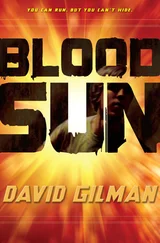Another noise. Loud banging, and then a crack. “It’s open!” she suddenly hears Mundt’s husband holler in triumph. “We’re through !” the man whoops. And the beams of light shift. She can see Marta Trotzmüller’s face, blood smeared across her forehead. Eyes moony. “Come, now, you cannot argue,” the woman begs. “The men have breached the escape way. We must go . If this little doll is to survive, then you must get her out .”
• • •
THE BUILDING ACROSS the street is burning, throwing off waves of heat. Silhouettes dash across the blinding, orange flicker. Sigrid is still cradling the baby, wrapped in one of the air raid blankets, as she staggers into the street. Clutching the little squalling being to her breast to protect it from the dust and smoke. Someone is calling her name, but it takes a moment for her to realize it. It takes a moment for her to realize that it is Carin, negotiating the chunks of rubble littering the asphalt street.
“I’m sorry,” Sigrid tells her. “I’m sorry. Your sister,” she says.
“Brigitte?” Carin gazes wildly at Sigrid’s face, the dance of the firelight reflecting in her eyes. Then she turns back a flap of the bundle and shifts her gaze to the tiny face screwed up with infant bawling. “My God… ”
“She is unhurt, I think. But I cannot stay. You must take her, Carin,” Sigrid says, and transfers the bundle into Carin’s arms. “Take her to the hospital. Get her treatment, then get her out .”
“Out?”
“She will need a mother now, Carin.”
“A mother? Don’t be absurd. I mean, how can I ?” Her face is stricken. All of its usual cynicism gone. “ How can I? A woman like me , alone?”
“A woman like you is exactly whom she needs. But you are not alone. You have your brother. Go to Wolfram. Find a way, Carin,” Sigrid tells her. “Get her out of this nightmare.”
SHE REMEMBERS THE TUNNEL. There’s a tunnel that connects the Anhalter Bahnhof, rising imperiously in stacks of yellow Greppiner brick above the Saarlandstrasse to the equally imperious Hotel Excelsior, with its massive columned façade. Sigrid remembers the tunnel from her childhood because of the row of underground shops where her mother once bought her a velvet frock, dark blue, like a night sky. She thought it was so very sophisticated, and was worried when her father wanted to know how much it was going to set him back. The shopgirl told him, and he snorted as if the price had blown up in his head like a sneeze. Her mother, however, intervened. It’s important, Günter, that she have something nice. Her father acquiesced, as he usually did, with a sigh that filled and then deflated his cheeks, making them resemble a gasbag. Later that afternoon they had lunch at a small café in the Pariser Platz that served a fruit cup that included oranges, and then rented a toboggan to go sledding down the drive of the Reichstag Building with a multitude of Berliner families. She remembers her father’s laughter as the two of them careened sideways into a snowbank. A boy’s laughter. A happy, unfettered chuckle. It made her feel good to hear him laugh, but also sad in a way, because his laughter was all about his own snow antics. It was not shared with her.
• • •
OUTSIDE THE STATION, a brass band of middle-aged Brownshirts has assembled in the open plaza with air-raid sandbags as a backdrop. The brassy clash as they tune up echoes in the vaulted ceilings of the bahnhof’s main portal.
Inside, the grandly appointed booking house, built for empire, has taken on a grimy, patched-up wartime face. Sandbags, boarded-up windows, chips, and cracks in the masonry. An immense swastika banner, edged with grime, hangs above the heads of the hordes of drab travelers, who grumble as they are herded by the loudspeakers.
Sigrid moves through the crowd with the same colorless sense of destination, but her eyes are crisp and alert. She has left her baggage behind in the rubble of the bombing. She had bathed and changed in the flat across the Askanischer Platz, picked out a clean dress from the wardrobe rack, scrubbed the residue of the bomb blast from her skin with a scouring brush in the tub down the hall, and then slept like a stone on the bed, without dreams. The bloodied, smoked, stained clothes she has left behind like a discarded skin. She has been born into a new entity. Part human, dressed in Carin’s sensible blue topcoat; part machinery, which armors her with purpose. When she spies Ericha loitering by the schedule cabinets she snatches her arm. Ericha snaps around with a dangerously cornered expression. “What are you doing here?”
“I’ve made some adjustments to the plan,” Sigrid answers. “Come,” she orders, and hauls her to a spot by the long row of schedule tables.
“I thought we had an agreement,” the girl hisses at her.
But Sigrid is covering the area with an extended German glance. “Where are they?”
“Where are who?”
“Frau Weiss and her daughters?”
“In the restaurant. They were hungry, I thought they should eat.”
“Are they alone?”
“Alone? It’s a crowded restaurant at lunchtime.”
“You know what I mean. Do you have someone with them?”
“No. No one. Look, you still haven’t explained—”
“What about the ‘addition’ you told me about? Where is he?”
“He’s hasn’t arrived yet.”
“Then there may still be time.”
“Sigrid.”
“He’s a traitor, Ericha.”
“ What? What are you saying ?”
“I’m saying whoever you think he may be, he’s either a fraud or he’s been turned. These people in this other group you’re connected with, they’re not to be trusted, do you understand? They’ve been compromised by the Gestapo.”
“No. No, you’re wrong.”
“Not this time,” Sigrid insists. “I know you’d like to believe that your instincts are infallible, but you’re not the pope. You’ve made a mistake. Now, come. We’ve got to get moving. Where is your man Becker? I don’t see him.”
“No,” Ericha repeats. Her voice has grown full and dark.
“No? No, what ?”
“No. You are wrong ,” she says. “The addition ,” she says, and shakes her head. “He’s a German-speaking Czech. The British parachuted him into the protectorate to organize sabotage cells in the arms factories. He’s been on the run from the Gestapo for months, all the way from Prague.”
Sigrid stops. Stares sharply into Ericha’s face. “So, that’s his story. We all have a story,” she says. “How do you know it’s not a lie?”
“I know , Frau Schröder,” she whispers blankly, “because I am the traitor.”
Sigrid goes silent. Closes her eyes and then opens them. Ericha is glaring straight ahead. “What I told you,” she says, “about the address on the cigarette card. It was not completely accurate. The Sipo detectives were waiting there. But the woman they arrested was me.”
“Child,” Sigrid whispers. But Ericha is still glaring like the tiger in its cage. “They took me to the Alex first,” she says. “But my name must have been on a list, because after a few hours, they trucked me over to the Prinz-Albrecht-Strasse. I was told they had prepared a little show for my benefit. A little show that should also be very educational. So I was taken down into the cellar, and manacled to a chair. Then in came two big Stapo men, dragging a woman between them, and I was made to watch while they stripped her, chained her to a table, and proceeded to beat her body with rubber truncheons.” The tears come only now, one followed by another, as the girl replays the scene inside her head. “At first she screamed. Sobbed. But after a while there were only these horrible animal grunts as the blows fell. Only then,” she says, “did they explain their proposition to me. It was very simple, really. All I need do is help them spring this trap. All I need do is betray everyone and everything , and I would not be harmed. Otherwise, I would be next on the table.”
Читать дальше












